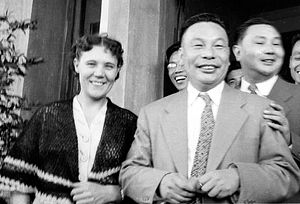The Uralmash heavy machinery plant, once known as the “father of factories,” is engulfed by verdure.
Novelist Lev Ovalov made that much clear in Zina Demina, his 1937 novel based on life at Uralmash. In his description, berries abound, factory employees hunt before work, and forest rangers fish and splash in the nearby lake. In the most rapturous passage, we are told that “One can walk a day, and a night, and another day, and another night, and the forest will still drag on.”
Sergey Ageyev, senior staff scientist and de facto historian of the Uralmash museum, admits Ovalov’s account was somewhat fanciful. “Not everything was accurate,” Ageyev says of the novelist, who worked for a time at the factory. “But some details about working life were right, though, of course, in compliance with the ideology of those days.” The most obvious example is the novel’s depiction of an almost symbiotic union between factory and surroundings, an attempt to paint socialism as part of the natural order.
But it is the characters that are truly interesting. In the eponymous heroine Zina, a factory worker, and her lover Zhou, the son of a governor of Nationalist China, we have the fictionalization of an extraordinary footnote to pre-war Sino-Soviet relations.
When Nikolai Vladimirovich Elizarov joined Uralmash in 1932, he stood out. Diminutive and ebullient, he was the only Chinese in the city. Moreover, he carried an air of distinction. Even those unaware of his background noticed the energy and commitment he put into every undertaking.
Those in the know were perhaps even more impressed, for the young Elizarov was Chiang Ching-kuo, son of Chinese President Chiang Kai-shek. That a such a man was prepared to graft among the hoi-polloi – which, despite their grand words on fraternity, few Bolshevik luminaries ever did – immediately allayed any prejudices his colleagues had. Initially resentful at a foreigner walking into a management role, factory worker Maria Anikeyeva admitted that “the Chinese … is very smart.” She and her husband Fyodor grew to respect and retain a deep affection for Chiang. “It always seemed that he was trying to open you up completely,” she observed. “We never saw him unhappy.”
They were not alone. “People liked him,” says Ageyev. “He was a smart guy. Most importantly, he managed to penetrate the working environment and understood all of its values.”































